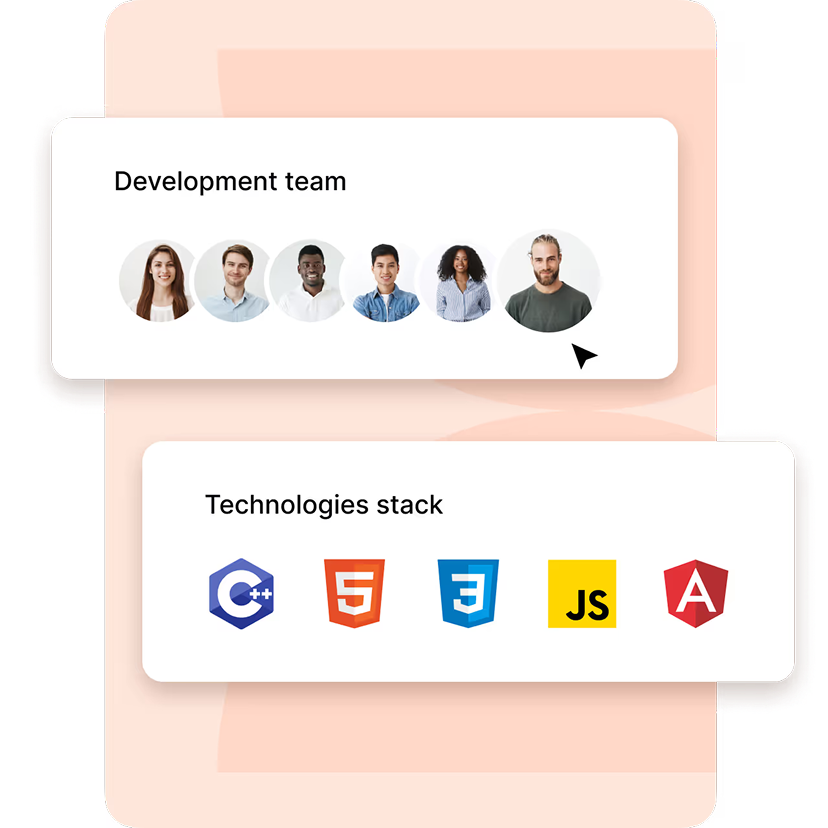Hire Struts Developers
Get a personalized demo now.webp)









A Struts developer is a professional specialized in utilizing the Apache Struts framework to build and maintain robust Java web applications. Proficient in Java and familiar with various web technologies, Struts developers address complex challenges related to the development of scalable, modular, and maintainable web applications. They leverage the Struts framework to streamline the implementation of the Model-View-Controller (MVC) architecture, manage application flow, and enhance user interactions.
Initially developed by Craig McClanahan, Struts aimed to simplify the creation of scalable and maintainable web applications using the Model-View-Controller (MVC) architectural pattern. As Struts gained popularity, it became an Apache project in 2001, fostering a vibrant open-source community. Struts 1, with its structured approach, set the stage for subsequent versions. The framework continued to evolve, and Struts 2, released in 2007, introduced a more modern architecture. Despite facing competition from other frameworks, Struts persists due to its robust features and the loyalty of its user base.
A Struts Developer is an expert in crafting and maintaining Java web applications using the Apache Struts framework. They focus on implementing the MVC architecture, managing application flow, and delivering robust, scalable solutions that align with business objectives.
Struts Developers play a pivotal role in driving the success of your web development initiatives.
- Architect and build scalable Java web applications leveraging the Struts framework for long-term business growth.
- Develop and maintain Struts action classes, forms, and XML configurations to streamline workflows and enhance maintainability.
- Integrate applications seamlessly with databases and external systems, ensuring smooth and reliable data management.
- Strengthen application security by applying Struts best practices and secure coding standards to protect sensitive business data.
- Enhance user experience through optimized interfaces using JSP, Struts tags, and dynamic form processing.
- Diagnose, troubleshoot, and resolve performance or integration challenges in existing Struts-based systems to minimize downtime and maximize efficiency.

Struts developers are in demand because of the enduring relevance of the Apache Struts framework in Java web application development. They address challenges related to building scalable, modular, and maintainable web applications using the Model-View-Controller (MVC) architecture. Struts developers play a vital role in optimizing application performance, ensuring secure data handling, and facilitating seamless integration with databases and external systems. The value of Struts is evident in its widespread adoption and the success of applications built on this framework.
Struts Framework
Leverage deep knowledge of Struts architecture, components, and configurations to deliver modular, maintainable Java web solutions that scale with business needs.
Java EE
Apply expertise in Java Enterprise Edition to develop reliable, enterprise-grade web applications that integrate seamlessly with Struts.
MVC Architecture
Implement the Model-View-Controller pattern in Struts to ensure clean separation of concerns, resulting in code that is easier to manage and extend.
XML Configuration
Configure and manage Struts XML files and mappings to define application flow and behaviors, enabling flexible and efficient project customization.
JSP/Servlets
Utilize JavaServer Pages and Servlets to create dynamic, interactive web interfaces within Struts applications, improving user engagement.
Form Handling
Streamline user input and validation processes by efficiently managing Struts form handling, ensuring secure and user-friendly data collection.
Action Classes
Design and maintain Struts action classes to effectively handle business logic and user requests, driving reliable application performance.
Tag Libraries
Employ Struts tag libraries and custom tags to simplify UI development and data presentation, accelerating project delivery.
Database Integration
Connect Struts applications to databases for consistent, secure data storage and retrieval, supporting critical business operations.
Job titles
Java Developer
Web Developer
Application Developer
Java Web Developer
Software Engineer
Front-End Developer
LinkedIn is a powerful tool for finding and hiring Struts developers due to its extensive professional network. You can leverage the platform's search filters to specifically target individuals with expertise in Java development, Apache Struts, and related technologies. Utilizing keywords such as "Struts developer," "Java web development," and "MVC architecture" in job postings and searches can help identify relevant candidates. You can also check their portfolios, endorsements, and recommendations, to assess the skills and credibility of potential hires.
Additionally, joining relevant groups and participating in discussions related to Java and Struts development can help establish connections with qualified professionals. By following these strategies you can find and hire Struts developers for your project.
Online job boards
Post job openings on Indeed, LinkedIn, Naukri, Glassdoor, and Stack Overflow Jobs.
Developer communities and forums
Engage with Struts developers on platforms like GitHub, Stack Overflow, and other related tech forums.
Tech conferences and meetups
Attend Struts and related events to network with talented developers. Search for the upcoming regional or global Struts developer conferences online.
HackerEarth hiring challenges
Sponsor online coding challenges to find competitive developers. For instance, Collins Aerospace collaborated with HackerEarth to run the Java and Python Fullstack Engineer Hiring Challenge in 2022.
Open source communities
Engage with active contributors in Struts or Java-related open-source projects. It can help you find good Struts developer portfolios.
Online learning platforms
Connect with Struts enthusiasts on online learning platforms like Udemy, Coursera, and Udacity.
Local universities and coding boot camps
Collaborate with local academies and educational institutions to find aspiring Struts Developers.
Social media channels
Use platforms like Twitter, LinkedIn, and Facebook to share projects and job openings for Struts developers. Engage with Struts communities and forums online to connect with developers.
Referrals and employee networks
Promote employee referrals and leverage existing networks to gather recommendations.
Hire top tech talent withour recruitment platform
Access Free Demo👍 Pro tip
Reddit is a great place to look for various Struts-related communities, including r/java, r/JavaMicroServices, r/learnjava, r/javahelp, etc. You can also join related Java Communities on Discord with thousands of members.
To hire a Struts Developer, the most common assessment framework on HackerEarth includes.
A combination of technical evaluations, coding exercises, and behavioral assessments. Here are some common components of the assessment framework:
Code completion tasks
Code completion tasks are valuable in hiring Struts developers during the interview assessment. For example, you can present candidates with tasks related to creating Struts action classes, configuring XML-based mappings, and implementing form validations within Struts. Evaluating how well candidates utilize Struts tags and integrate them with Java code can demonstrate their understanding of the framework's nuances. By incorporating these tasks, employers can identify and hire Struts developer who can efficiently build and maintain web applications using the Struts framework.
Multiple-choice questions (MCQs)
MCQs are beneficial for hiring Struts developers by assessing their familiarity with the Struts framework. For instance, you can ask questions focusing on Struts configuration files, action classes, and the integration of Struts with JavaServer Pages (JSP). Assessing candidates on their knowledge of Struts tags, form validations, and the MVC (Model-View-Controller) architecture within Struts provides insights into their proficiency. Furthermore, including questions on handling user input, error handling mechanisms, and Struts best practices can help identify developers with a solid understanding of Struts development.
Project-specific questions
Project-specific questions are essential for hiring Struts developers as they assess a candidate's practical expertise in Struts framework application. Inquiring about strategies for optimizing Struts actions or troubleshooting performance issues in a specific Struts project reveals a candidate's ability to navigate real-world challenges. Customizing questions to the nuances of Struts projects ensures that candidates possess the specific knowledge and experience needed for effective contributions to the development team.
Language-specific questions
Language-specific questions are instrumental in hiring Struts developers as they assess a candidate's proficiency in languages integral to Struts development, such as Java and JSP. Inquiring about their experience with integrating JavaBeans into Struts applications or implementing custom validations showcases their depth of knowledge. Language-specific questions tailored to Struts development can help you hire Struts developer with the specific coding skills required for effective contributions to Struts-based projects.
Our bias-free, objective platform has facilitated 1,00,000+ assessments per month
Get a personalized demo nowCode completion task
- Create a Struts form with fields for username, email, and password. Implement server-side validation for the form, ensuring that the username is unique, the email is valid, and the password meets specified criteria.
- Build a JSP page that utilizes Struts tags to display a dynamic list of items retrieved from a Struts action. Include functionality to edit and delete items from the list.
- Design a Struts action that handles user authentication. Validate the user credentials against a predefined set and redirect authenticated users to a secure area, displaying an error message for unsuccessful logins.
Multiple-Choice Questions (MCQs)
- What is the purpose of the `execute` method in a Struts Action class?
- Render the view
- Process the request
- Define the action mapping
- Handle form validation
- Which Struts tag is used to iterate over a collection in JSP?
- <s:iterator>
- <s:forEach>
- <s:iterate>
- <s:loop>
- In Struts 2, where is the primary configuration file (struts.xml) typically located?
- WEB-INF
- META-INF
- src
- root directory
Questions related to Struts Tags and View Layer Design
- How can you include other tag libraries, such as the JSTL, within a JSP page that uses Struts tags?
- Explain how you can conditionally render content in a JSP page using Struts tags.
- How can you use Struts tags to iterate over a collection in a JSP page?
- Explain the purpose of the tag in Struts.
- What is the purpose of the and tags in Struts?
Struts Actions and Form Processing questions
- What is the role of an Action class in the Struts framework?
- Explain the purpose of ActionForms in Struts and how they handle user input.
- How can you perform form validation in Struts?
- What is the significance of the struts.xml file in configuring action mappings?
- What are result types in Struts, and how do they affect the navigation flow?
👍 Pro tip
These sample questions provided here are for interviewing early-experience talents. For more customized assessments for candidates with higher experience, you can contact our team at contact@hackerearth.com or request a demo here.
Job title
Begin with a clear and concise job title that reflects the role, such as "Application Developer", "Web Developer", and "Java Developer".
Job summary
Provide a brief overview of the position, focusing on the essential responsibilities and objectives. Describe the main aspects of the role and how it contributes to the company's goals.
Responsibilities
Outline the specific tasks and responsibilities that the Struts developer will be expected to handle. This may include:
- Designing and implementing robust web applications using the Struts framework.
- Creating and maintaining Struts action classes, forms, and configurations.
- Effectively utilizing Struts tags and JSP for dynamic content generation and rendering.
- Implementing server-side validation for user inputs in Struts forms.
- Ensuring data integrity through proper validation, error handling, and secure coding practices.
- Developing applications that dynamically generate forms based on configuration files.
- Defining form fields, types, and validation rules in the configuration for flexibility.
Struts Developer Skills and Qualifications.
List the essential skills and qualifications that candidates must possess, including, but not restricted to:
- Proficiency in creating and maintaining Struts action classes, forms, and configurations.
- Effective utilization of Struts tags and JSP for dynamic content generation and rendering.
- Implementation of server-side validation for user inputs in Struts forms.
- Development of applications that dynamically generate forms based on configuration files.
- Integration of Struts tags to display and manipulate data, enhancing the user interface.
- Implementation of features like Ajax-based autocompletion for improved user interaction.
Preferred skills
Mention any additional Struts developer skills or qualifications that would be beneficial but not mandatory for the role. You can also ask for experience with specific tools, libraries, or frameworks.
Education and experience
Specify the educational background and professional experience required for the position. This could range from a bachelor's degree in computer science or a related field to several years of relevant experience.
Company culture and EVPs
Briefly highlight your company's culture, values, and any unique perks or benefits offered to employees that can help attract candidates who align with your company's ethos.
Application instructions
Provide instructions on how candidates can apply for the position. Include where to send their resume, portfolio, or other required documents. Also, specify the deadline for applications, if applicable.
Equal Opportunity Statement
Include a statement affirming that your company is an equal opportunity employer committed to diversity and inclusion.
Skill-first hiring requires that the developer interview process be designed to understand the candidate’s skill and experience in the given domain. You can consider the following guidelines when conducting a face-to-face interview with a Struts developer:
Conduct a real-time technical assessment
Usually candidates are given a remote assessment before the interview. However, using the interview platform to assess skills in real time will tell you a lot about the candidate’s communication skills and thought process.
FaceCode is HackerEarth’s flagship tech interview platform with a built-in question library you can use to test the candidate’s knowledge of Struts concepts. The built-in IDE environment can be used for assessing their ability to write clean, efficient, and maintainable code. You can also use the pair-programming method to observe their problem-solving approach, logical thinking, and attention to detail.
Learn how Facecode can make tech interviews easier
Understand the candidate’s project experience and review the portfolio
During the interview, explore the candidate's past and present projects. Focus on their personal contributions and the skills they used. Ask them to discuss a Struts project, detailing their responsibilities, problem-solving, and collaboration. If available, review their portfolio or code samples for coding style, documentation, and project quality.
Understand if they are a good culture and team fit
While technical skills are essential for a developer, the significance of cultural fit should not be overlooked. The ideal candidate must possess not only accurate coding abilities but also effective communication and collaboration skills to thrive in agile and collaborative environments. Evaluating a candidate's capability to work both independently and collaboratively in a team is crucial. This assessment provides valuable insights into the candidate's problem-solving skills, communication, and adaptability, helping to determine their fit for the role and the team dynamics.
United States
Salaries are highest in major cities and for developers with advanced Struts expertise, particularly in industries such as finance, enterprise software, and large-scale web applications.
- Average Annual Salary: $93,775–$114,928 per year (Software Developer/Java Developer with Struts experience)
- Entry-Level: $76,000–$90,000 per year
- Mid-Level: $95,000–$110,000 per year
- Senior-Level: $110,000–$130,000+ per year
United Kingdom
London and other major cities offer higher salaries, particularly for senior roles or those with advanced Struts and Java EE programming skills.
- Average Annual Salary: £45,000–£70,000 per year (Software/Web Developer with Struts skills)
- Entry-Level: £35,000–£45,000 per year
- Mid-Level: £50,000–£60,000 per year
- Senior-Level: £60,000–£75,000+ per year
Australia
Salaries are highest in Sydney and Melbourne, with top pay for experienced and senior developers, particularly in organizations focusing on performance-critical or enterprise applications.
- Average Annual Salary: A$100,000–A$130,000 per year (Software Developer with Struts experience)
- Entry-Level: A$80,000–A$100,000 per year
- Mid-Level: A$105,000–A$120,000 per year
- Senior-Level: A$120,000–A$140,000+ per year
What qualifications should I look for in a Struts Developer?
In the search for a Struts Developer, prioritize candidates with a solid background in web application development using the Struts framework. Look for expertise in creating and maintaining Struts action classes, forms, and configurations, alongside a proficiency in utilizing Struts tags and JSP for dynamic content generation. Prior experience in implementing robust form validation, user authentication, and authorization mechanisms within Struts applications is essential.
Do we require the candidate to have experience in all the necessary tools or just one is enough?
For a Struts Developer, it is crucial to possess comprehensive experience in the necessary tools specific to Struts development rather than a broad array. Proficiency in the Struts framework, including action classes, forms, and JSP, is paramount. A deep understanding of form validation, dynamic forms, user authentication, and integration of Ajax for an enhanced user experience within Struts applications is essential.
What are the skillsets of a Java Developer?
A proficient Java Developer possesses a robust skill set encompassing core Java programming, object-oriented design principles, and proficiency in Java frameworks such as Spring and Hibernate. Expertise in database management, particularly with SQL and relational databases, is essential. Strong knowledge of web development using technologies like Servlets, JSP, and front-end frameworks is expected.
How to assess a candidate's real-world project-handling skills?
To evaluate a Struts developer's real-world project-handling skills, conduct a detailed discussion on their past Struts projects. Request a walkthrough of the project lifecycle, focusing on design choices, utilization of Struts features, and solutions to encountered challenges. Assess their proficiency in handling form validation, dynamic forms, user authentication, and integration of Ajax for enhanced user experience. Inquire about their approach to optimizing Struts applications for performance and scalability.
How does the requirement for Struts developer skills change across various job roles?
The demand for Struts developer skills varies across job roles based on the specific responsibilities. For a Front-end Developer, proficiency in utilizing Struts tags for dynamic content rendering and integrating Ajax features may be emphasized. Back-end Developers may need a deeper understanding of Struts actions, form handling, and security mechanisms. Full-stack Developers should exhibit a balanced skill set covering both front-end and back-end Struts development.





.webp)
.webp)
.webp)
.webp)
.webp)
.webp)
.webp)
.webp)
.webp)
.webp)
.webp)





.webp)


.webp)












